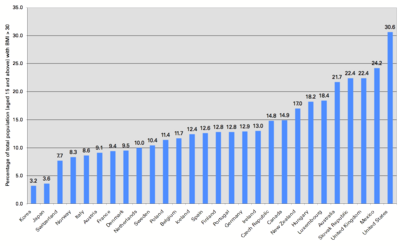Obesity
Obesity is a condition where the natural energy reserve, stored in the fatty tissue of humans and mammals is increased to a point where it is thought to be a significant risk factor for certain health conditions as well as increased mortality. Obesity in wild animals is relatively rare, but it is common in domestic animals like pigs and household pets who may be overfed and underexercised. more...
Excessive body weight has been shown to correlate with various important diseases, particularly cardiovascular disease, diabetes and osteoarthritis. Interventions, such as diet and exercise as well as medication and weight-loss surgery in severe cases are frequently recommended to reduce the risk of developing disease.
Definition
Obesity is a concept that is being continually redefined. In humans, the most common statistical estimate of obesity is the body mass index (BMI), calculated by dividing the weight by the height squared; its unit is therefore kg/m2, although no actual surface is implied. The BMI was created in the 19th century by the Belgian statistician Adolphe Quetelet.
Interpretation of the BMI:
- A person with a BMI over 25.0 kg/m2 is considered overweight.
- A BMI over 30.0 kg/m2 denotes obesity.
- A further threshold at 35.0 kg/m2 is identified as urgent morbidity risk (morbid obesity).
The American Institute for Cancer Research considers a BMI between 18.5 and 25 to be an ideal target for a healthy individual (although several sources consider a person with a BMI of less than 20 to be underweight).
The cut-off points between categories are occasionally redefined, and may indeed differ from country to country. In June 1998 the National Institutes of Health brought official U.S. category definitions into line with those used by the WHO, moving the American "overweight" threshold from BMI 27 to BMI 25. Thresholds are in principle designed to be "best estimates" concerning health risk at the time they are established and are also designed to ensure cohort uniformity in epidemiological studies. About 30,000,000 Americans moved from "ideal" weight to being 1–10 pounds (0.5–5 kg) "overweight". In 2000, WHO was advised to consider lowering the BMI threshold for overweight in Asians from BMI 25 to BMI 23, and for obesity in Asians from BMI 30 to BMI 25, due to epidemiological studies indicating that Asians suffer a greater number of obesity-related conditions at lower BMI; however, to date, WHO has not made any changes in recommendations. In addition, some clinicians suggest raising the BMI thresholds for those of African, African-American, and Polynesian descent because members of these groups have a greater ratio of lean body mass to fat at all body weights; the proposed thresholds for these groups are BMI 26 for overweight, and BMI 32 for obesity. To date, no major professional or medical organization has officially adopted this suggestion. In the future, a healthy BMI for a given individual may be defined to some extent by his ethnic or racial origin or gender.
Read more at Wikipedia.org




